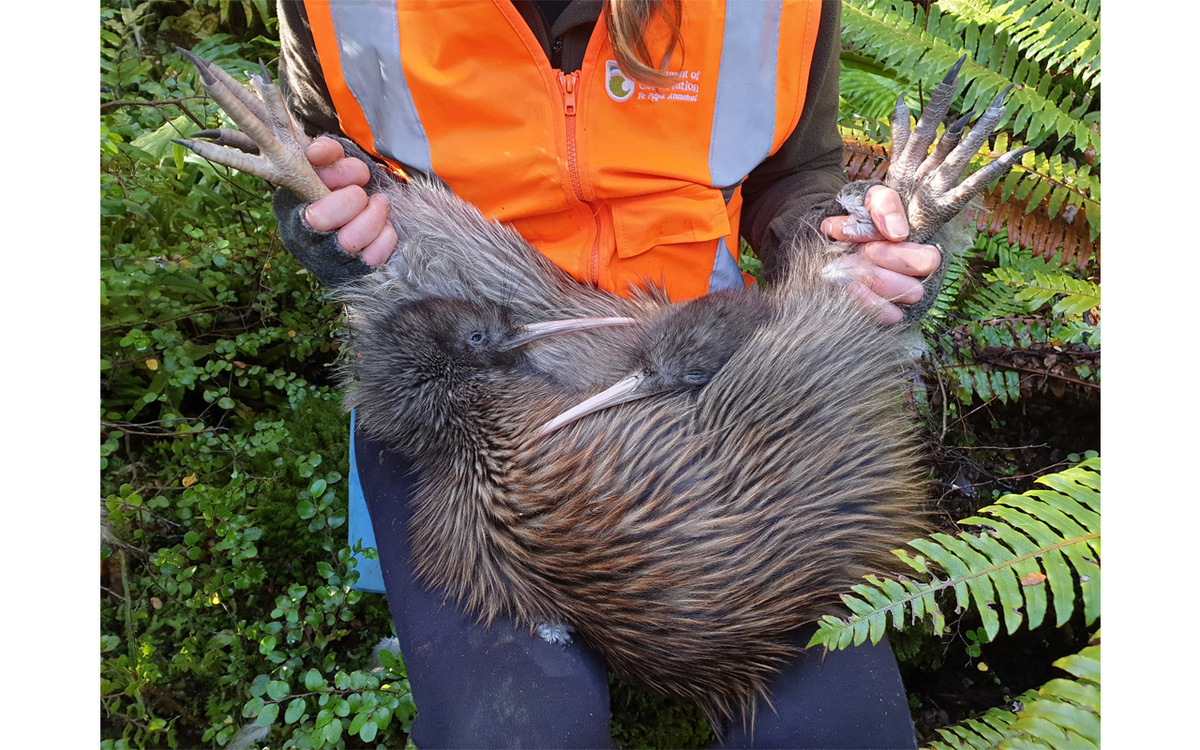Kiwi creche successfully checked after lockdown
Lucy Henry
24 May 2020, 5:18 PM
 Juvenille Haast tokoeka (brown kiwi), living on pest-free Rona Island in Lake Manapouri, have been successfully checked following the COVID-19 lockdown. PHOTO: Jane Tansell
Juvenille Haast tokoeka (brown kiwi), living on pest-free Rona Island in Lake Manapouri, have been successfully checked following the COVID-19 lockdown. PHOTO: Jane TansellDOC rangers have managed to successfully check up on the six juvenile Haast tokoeka (Brown Kiwi) living on Rona Island in Lake Manapouri after being delayed access to the island due to the Alert Level restrictions.
Since Level 2 began, rangers have been busy finding all of the juveniles on the island to dose them with medicine for coccidia parasites and most importantly, change their transmitter harnesses before they outgrew them.
Senior DOC Ranger Inge Bolt said they were concerned that the birds might outgrow their harnesses if the country had of stayed in Level 3 for an extended period of time, as their harnesses need to changed every three months.
Fortunately, Alert Level 3 was lifted before the birds came into any danger.
The Haast Tokoeka can also be tricky to find as Dr Bolt said they were good at hiding and evading capture. Rangers use 'radio telemetry technology' to locate the birds but Dr Bolt said it only worked when a ranger was moving around the 60-hectare island.
"Sometimes you can be lucky and find one in 15 minutes but sometimes it can take you three hours," she said.
Each bird has its own radio frequency emitting from their transmitters so rangers can keep track of which ones have been checked.
The island is a "creche" site and haven for the birds as it's free from predators, which give these threatened taonga the best chance at survival.
The baby birds are brought to the island as chicks from the Haast Tokoeka Sanctuary as part of what DOC calls "Operation Nest Egg".
DOC rangers collect the bird eggs from the Haast Tokoeka sanctuary which are then taken to the West Coast Wildlife Centre. Once the eggs have hatched, they are taken to Orokonui where they are weaned off captive food and then finally taken to Rona Island where they are fitted with transmitters and are able to start life roaming around free from predators.
DOC Supervisor for the Haast Bio team Stacey Lockie said without operation Nest Egg, juvenile Haast tokoeka have only a 5% chance of surviving in the wild as the baby birds can be regularly preyed upon by stoats.
When the juveniles reach around 1.6kg, they are taken back to Haast Tokoeka Sanctuary in groups and re-introduced into the wild where they have a better chance of survival at a larger size.
Dr Bolt said all the juveniles on Rona Island were all around 1kg so they would be ready to be moved back to the sanctuary around October.
Miss Lockie said eventually the goal was to not need operation Nest Egg at all.
“If we could provide better protection in the sanctuary then all of the birds would be protected, the issue is we don’t know how much [protection] that is.”
She said DOC believed it was only finding about one quarter of the eggs that are laid in the Haast Tokoeka Sanctuary, which covers 1200 hectares of bush.
She said DOC was increasing the number of stoat traps in the area (currently 2000 traps) and was monitoring its 1080 poison drops to see how they could be improved to make life for juvenile Haast tokoeka more viable within the sanctuary.
AG | TRADES & SUPPLIES
FOOD | DRINK

